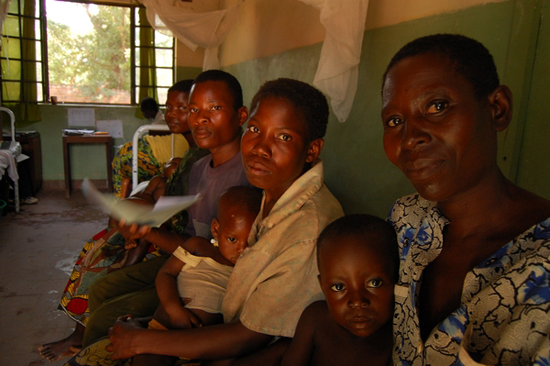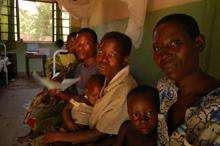As tensions increase between government forces and Mai-Mai militias in Katanga province, all parties must avoid harming thousands of civilians who have fled into the surrounding bush.

DRC 2012 © Sandra Smiley/MSF
Patients in the inpatient department of an MSF hospital in Katanga Province.
NEW YORK, JANUARY 25, 2013—As tensions increase between government forces and Mai-Mai militias in Katanga province, southeastern Democratic Republic of Congo, all parties must avoid harming thousands of civilians who have fled into the surrounding bush, Doctors Without Borders/Médecins Sans Frontières (MSF) said today.
The exact extent of the displacement is hard to quantify, but most of the villages along a 115-kilometer [about 71 miles] road from Shamwana to Dubie are empty, as are villages along a 70-kilometer [about 43 miles] stretch between Shamwana and Mpiana.
"Civilians risk being caught up in the fighting and mistaken for combatants," said Christine Slagt, MSF project coordinator in Shamwana. "Some militia groups are preventing people from leaving the area."
This week, MSF removed nonessential staff from its referral hospital in Shamwana, about 300 kilometers [about 186 miles] from the provincial capital Lubumbashi, leaving a skilled core team with surgical capacity to respond to an expected increase in war-wounded patients.
MSF has been running the hospital since May 2006, providing people living in the Kiambi, Mitwaba, and Kilwa health zones with free health care. Medical teams treat malaria, tuberculosis, HIV/AIDS, and malnutrition, and provide reproductive health services, mental health care, and emergency surgery.
The medical consequences of displacement are severe, with many patients now unable to return to health facilities to continue essential medical treatment. The majority of children in MSF nutritional programs have now defaulted, as have most patients receiving antiretroviral treatment for HIV/AIDS. A measles vaccination campaign in September was interrupted when people fled due to fighting in Kiambi, leaving thousands of children susceptible to an outbreak of the disease.
Over the last five years, MSF surgeons in Shamwana have operated on hundreds of women for internal injuries sustained during childbirth, but the current displacement has halted these efforts as well.
To make matters worse, the region is experiencing a peak in malaria due to the rainy season. Since October, MSF has treated on average nearly 1,000 patients per week for the disease, most of whom are children under 5 years of age.
"We’re particularly concerned about the very vulnerable hiding in the bush who cannot access medical care," Slagt said. "Severe malaria can be fatal in children if left untreated and pregnant women with complications during labor are in a life-threatening predicament."
The area of the conflict has a violent history. In 2005, clashes between Mai-Mai rebels and the military in Katanga resulted in a traumatized population. Many people witnessed or experienced violence and rape, had family members killed, fled because of fighting, or saw their homes and possessions go up in flames. Since then, there was relative calm in the region until recently.




